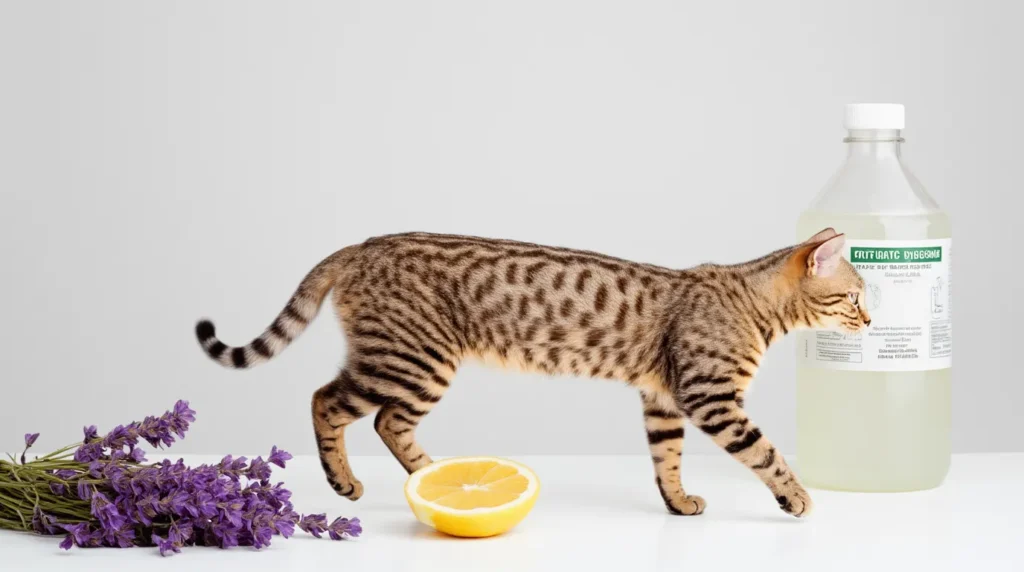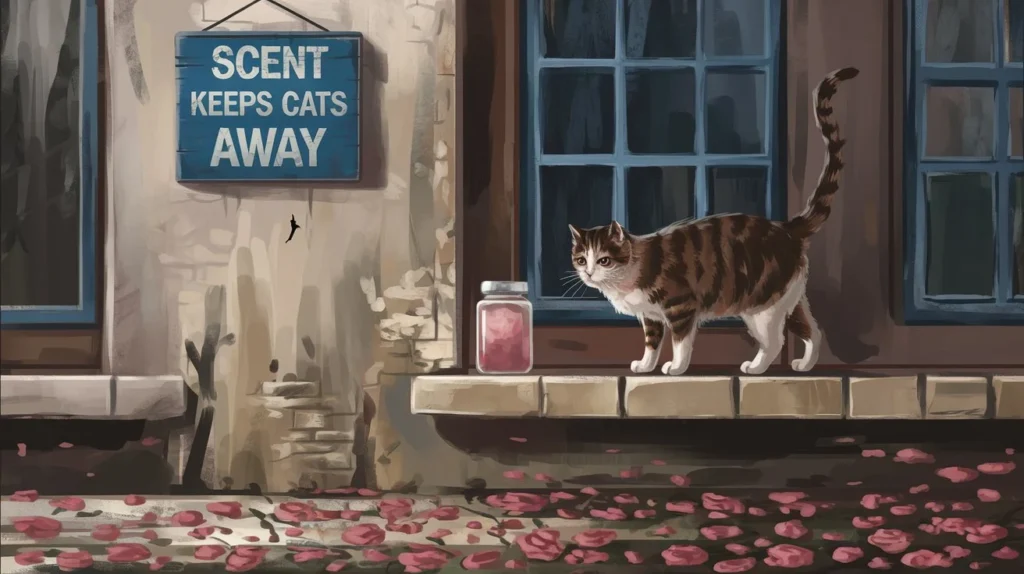Are you tired of finding paw prints in your freshly planted flower beds or discovering that neighborhood cats have turned your garden into their personal litter box? If so, you’re probably wondering, “What scent keeps cats away?” Fortunately, there are several effective, natural, and humane solutions to this common problem. In this comprehensive guide, we’ll explore various scents that repel cats, thereby helping you maintain a cat-free zone in your outdoor spaces and even indoors.
Understanding Cat Behavior and Scents: What Scent Will Keep Cats Away?
Before diving into specific repellents, it’s crucial to understand why certain scents are effective in deterring cats. As a matter of fact, cats have a highly developed sense of smell, which they use for communication, hunting, and avoiding potential dangers. Therefore, using the right scents can be a powerful tool in keeping cats at bay.
The Power of a Cat’s Nose: Why Scents Matter
Where cats differ is that their olfactory system is remarkably impressive, bearing in mind that while a human has 5 million odor-sensitive cells in the nose, a cat has approximately 200 million. This obviously heightens their sense of smell, but with that also comes vulnerability to odors-both pleasant and not so pleasing. Therefore, the strategic application of odors that would be particularly offensive to a cat should prove to be an extremely good deterring method.
Natural Scents That Keep Cats Away: Exploring Effective Options
Now that we understand the basics, let’s explore the question, “What scent keeps cats away?” by examining some natural options that have proven effective in repelling our feline friends.
Citrus Scents: A Feline’s Nemesis in Your Garden
When considering what citrus scent to keep cats away, you have several options. In general, cats dislike the strong, sharp smell of citrus fruits. Specifically, lemon, orange, and lime are particularly effective. Here’s how you can use citrus to deter cats:
- Firstly, scatter fresh citrus peels around your garden or areas you want to protect.
- Secondly, mix a few drops of citrus essential oil with water in a spray bottle and apply to problem areas.
- Lastly, grow citrus trees or plants like lemon thyme or citronella grass in your garden.
Herbs and Spices: Nature’s Cat Repellents for Your Yard
Several common herbs and spices can answer the question, “What scent is best to keep cats away?” These include:
- To begin with, rosemary, with its strong, pine-like scent, is off-putting to most cats.
- Additionally, lavender, while calming to humans, tends to be avoided by cats.
- Furthermore, rue has a bitter smell that cats find particularly unpleasant.
- Moreover, thyme’s strong aroma can help keep cats at bay.
- Finally, the spicy scent of cinnamon is often too intense for cats.
To use these herbs and spices effectively:
- First, plant them around the perimeter of your garden.
- Next, create sachets filled with dried herbs to place in problem areas.
- Lastly, use essential oils derived from these plants (diluted and used safely).
Essential Oils: Concentrated Cat Deterrents for Effective Control
Essential oils can be amazingly potent when trying to determine what scents keep cats away. Unfortunately, due to the fact that some may cause harm if ingested or applied directly to a cat, their use should be practiced with safety and moderation. The following essential oils are effective for this purpose:
- To start with, peppermint oil is a strong deterrent.
- In addition, eucalyptus oil can be effective.
- Furthermore, tea tree oil can work, but use it with extreme caution.
- Moreover, citronella oil is known to repel various pests, including cats.
- Lastly, lemongrass oil can be an excellent cat deterrent.
To use essential oils safely:
- First, dilute them properly (usually 5-10 drops per cup of water).
- Then, apply to areas cats can’t directly contact.
- Finally, refresh the scent regularly, especially after rain.
Commercial Products: What Scent Will Keep Cats Away Reliably?
While natural options are preferable, sometimes you need a more potent solution. As a result, several commercial products are designed to answer the question, “What scent keeps cats away?” effectively:
- First, motion-activated sprinklers combine an unexpected spray of water with the scent of the water itself to deter cats.
- Second, granular repellents, often containing predator urine or other strong scents, can be sprinkled around your property.
- Finally, ultrasonic devices, while not scent-based, emit high-frequency sounds that cats find unpleasant.
When choosing a commercial product, consider:
- Firstly, safety for cats, other animals, and plants.
- Secondly, ease of application and maintenance.
- Lastly, long-term effectiveness and need for reapplication.
Creating a Comprehensive Cat-Repelling Strategy: Combining Scents and Techniques
To maximize the effectiveness of scents in keeping cats away, it’s best to employ a multi-faceted approach. By combining various methods, you can create a robust defense against unwanted feline visitors.
Combine Multiple Scents: Enhancing Your Cat Repellent Arsenal
Using a variety of repellent scents can increase your success rate. In fact, cats may become accustomed to a single scent over time, so rotating or combining different odors can maintain effectiveness. For instance, you might use citrus scents in one area and herb-based repellents in another.
Address Attractants: Eliminating What Brings Cats to Your Yard
While focusing on repellents, don’t forget to eliminate things that might be attracting cats to your property:
- First, secure garbage cans to prevent foraging.
- Then, remove sources of standing water.
- Finally, keep bird feeders clean and minimize spilled seed.
By addressing these attractants, you’re not only asking, “What scent keeps cats away?” but also, “What can I do to make my property less appealing to cats in the first place?”
Create Physical Barriers: Complementing Scents with Obstacles
Complement your scent-based strategy with physical deterrents:
- To begin with, install motion-activated lights.
- Next, use prickly plants or materials in garden beds.
- Lastly, cover soil with materials cats dislike walking on, such as pine cones or rough mulch.
These physical barriers work in tandem with repellent scents, thus creating a multi-layered defense against feline intruders.
Safety Considerations When Using Scents to Repel Cats: Protecting All Creatures
While exploring what scent keeps cats away, it’s crucial to prioritize safety for all creatures involved, including the cats you’re trying to deter.
For Cats: Ensuring Humane Deterrence
Even though the goal is to deter cats, it’s important not to harm them:
- First and foremost, avoid using toxic plants or substances.
- Additionally, ensure repellents are used in areas cats can easily avoid.
- Most importantly, never apply essential oils directly to a cat’s fur or skin.
For Other Animals and Plants: Maintaining Ecological Balance
Consider the impact of your chosen repellents on:
- Firstly, beneficial insects and pollinators.
- Secondly, other pets or wildlife in the area.
- Lastly, your plants and soil health.
It’s essential to strike a balance between effective cat repellents and maintaining a healthy ecosystem in your garden.
For Humans: Keeping Your Space Pleasant for People
Some strong scents can affect people as well:
- First, be mindful of allergies or sensitivities to certain plants or essential oils.
- Then, keep strong-smelling substances away from areas where people frequently gather.
- Finally, inform neighbors if you’re using any potent repellents near property lines.
By considering the impact on humans, you ensure that your cat-repelling efforts don’t negatively affect your enjoyment of your outdoor spaces.

Maintaining a Cat-Free Zone: Long-Term Strategies for Lasting Results
Keeping cats away isn’t a one-time effort. In fact, to maintain a cat-free area over time, you’ll need to be consistent and adaptable in your approach.
Regular Reapplication: Ensuring Continuous Protection
Most scent-based repellents will need to be reapplied regularly, especially after rain or heavy dew. Therefore, create a schedule to ensure consistent protection:
- First, check and refresh citrus peels weekly.
- Then, reapply essential oil sprays every few days.
- Lastly, replenish granular repellents according to package instructions.
By maintaining a regular schedule, you can ensure that the question “What scent keeps cats away?” is consistently answered in your garden.
Seasonal Adjustments: Adapting Your Strategy Throughout the Year
Different seasons may require different approaches:
- In spring, focus on protecting newly planted areas.
- During summer, the heat may intensify some scents, requiring less frequent application.
- In fall and winter, changes in cat behavior may necessitate adjustments to your strategy.
By adapting your approach to the seasons, you can maintain effective cat repellent strategies year-round.
Monitor and Adapt: Fine-Tuning Your Cat Repellent Techniques
Monitor the success of the strategies you’ve implemented:
- First, observe cat activity in your yard.
- Then, note which scents seem most effective.
- Finally, be prepared to try new combinations if cats become accustomed to certain repellents.
Through careful observation and willingness to adapt, you can continually improve your cat-repelling strategy.
FAQs: Common Questions About Cat-Repelling Scents
To further address the question “What scent keeps cats away?” let’s explore some frequently asked questions:
Q: Are these scents safe for my own cats if I have them as pets?
A: While most repellent scents are safe when used as directed, it’s best to consult with your veterinarian, especially if you’re using essential oils or commercial products around your own cats.
Q: How long do these scents typically last?
A: The longevity of repellent scents varies. For instance, natural options like citrus peels may need replacing every few days, while commercial granular repellents might last several weeks.
Q: Can I use these scents indoors to keep cats off furniture?
A: Yes, many of these scents can be used indoors, but use caution. Therefore, ensure proper ventilation and start with small amounts to avoid overwhelming indoor spaces.
Q: Will these scents harm my plants?
A: Most natural repellents are safe for plants. However, some essential oils can be potent, so it’s best to test on a small area first and dilute properly.
Q: What if the cats in my neighborhood seem immune to these scents?
A: Cats can vary in their sensitivity to different odors. If one scent doesn’t work, try combining multiple repellents or rotating different scents over time.
Q: How can I keep cats away from my Christmas tree?
A: Keeping cats away from Christmas trees can be challenging, but many of the scents we’ve discussed can be effective. For more specific tips and techniques, check out our detailed guide on what smells keep cats away from Christmas trees.
Conclusion: Mastering the Art of Cat Repellent Scents
In answering the question “What scent keeps cats away?”, we’ve explored a variety of natural and commercial options. From citrus fruits to essential oils, herbs to specialized products, there are numerous ways to create an environment that cats prefer to avoid. Remember, the key to success lies in consistency, variety, and humane application of these methods.
By understanding cat behavior, experimenting with different scents, and maintaining a vigilant approach, you can effectively protect your garden, home, and peace of mind from unwanted feline visitors. Always prioritize the safety of cats, other animals, and the environment when implementing any repellent strategy.
All it takes is a little patience and persistence to find just the right mix of scents and methods that keep cats out of your space so you can finally enjoy your outdoor spaces with no worries. Happy gardening, and may your flower beds remain free of paw prints!
Remember, the question “What scent keeps cats away?” doesn’t have a one-size-fits-all answer. Instead, it’s about finding the right combination of scents and strategies that work for your specific situation. By applying the knowledge and techniques discussed in this guide, you’ll be well-equipped to create a cat-free environment in your garden and home.
Remember, it’s all about persistency as you put these methods into practice. Continue replacing your chosen scents with new ones from time to time, change different repellents so the cats don’t get used to specific smells, and finally, always be prepared to change your approach if needed. In no time, with experience, you will become a seasoned expert in the use of scented deterrence that will keep at bay these critters with fur, allowing you space to sit outside in comfort without distraction.








